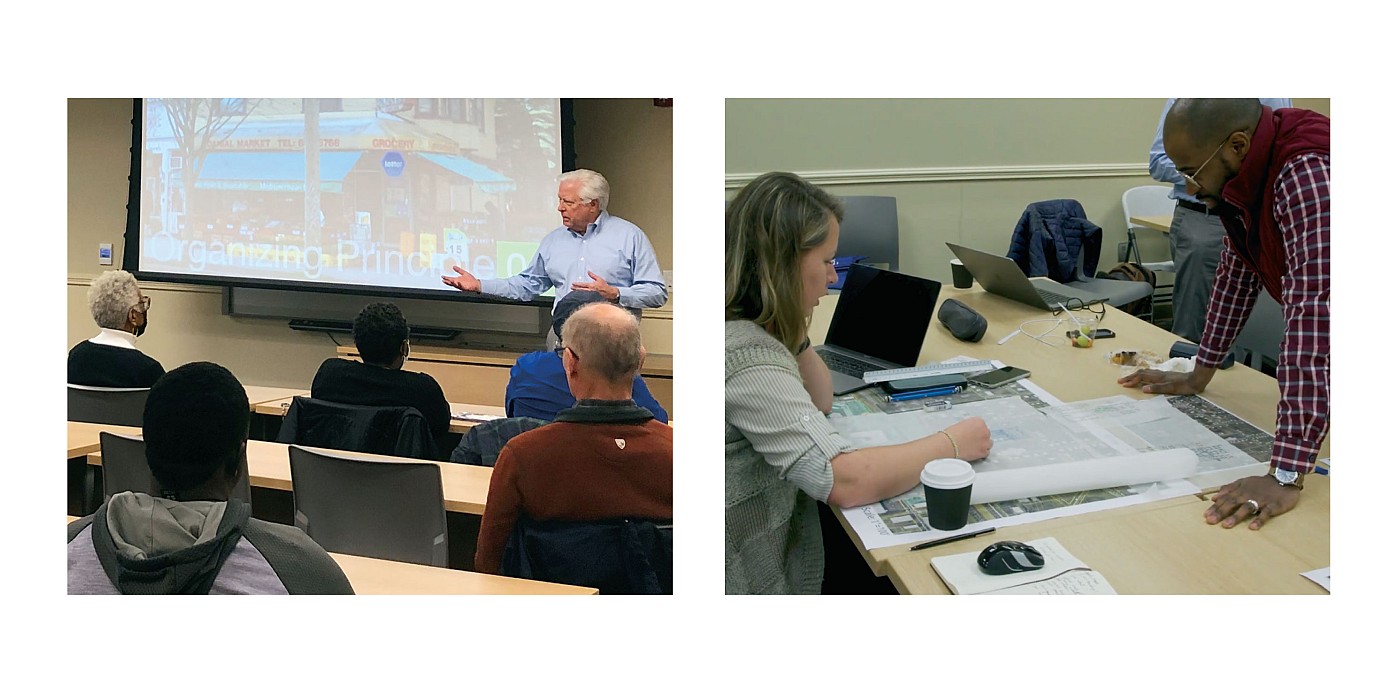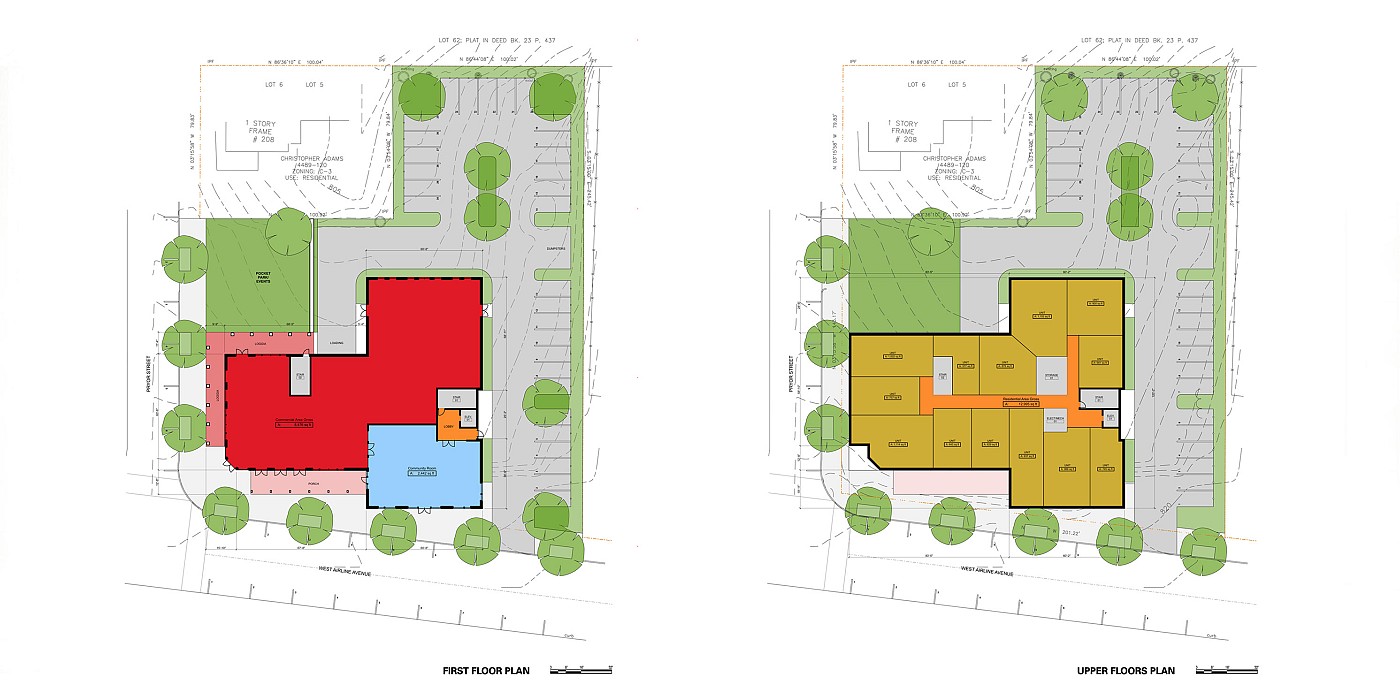- You have not saved any projects.
Healthy Highland
Shook Kelley was part of a collaborative effort to create a community plan that builds on the success of a food kitchen for a neighborhood in the crosshairs of gentrification, adding healthy food and affordable housing.






Shook Kelley worked in collaboration with Fabric[K] Design on a CNU Legacy Project design charrette sponsored by the Highland Neighborhood Associaton, Kintegra Health, and CNU. Legacy Projects are annual design and implementation events that apply placemaking to make a difference in the Congress' host region each year. This Project is part of the City of Charlotte's host year for the Annual Congress (CNU 31) in 2023.
The Highland neighborhood, located on the edge of downtown Gastonia, North Carolina, is planning to grow in a healthy and walkable way. Building on a non-profit food kitchen, the design team gathered with the community to plan and design for a building with affordable housing and ground floor commercial space for RAMS Kitchen (Really Amazing Meals with Soul). The Healthy Highland program, a public-private partnership, launched RAMS Kitchen in 2021 to serve quick, nutritious meals for $5, while paying a living wage and benefits to it's employees. This enterprise is key to providing a grocery store for the community, an operation that residents have long requested to decrease their reliance on corner stores that exacerbate existing health disparities.
The proposed development will serve as a driving force for a broader urban development strategy that targets social, economic, and health conditions.
Gastonia and surrounding Gaston County to the west of Charlotte and Mecklenburg County are some of the last remaining sectors of the region to feel the heat from what has been a powerful Charlotte economic engine. Now, the winds of development are blowing towards the small city. Gastonia's economic development zone called FUSE (adjacent to Highland) is driving investment, including a minor league baseball stadium and planned market-rate multifamily units. Because housing product in Highland is inexpensive, it's residents are concerned that prices will rise as the FUSE investments stimulate the local market. The vision for a Healthy Highland calls for the neighborhood where housing stays affordable to a broad range of income levels.
During the three-day charrette, the team produced plans and designs for the building, block, and neighborhood scale to accomplish three goals:
- To promote the implementation of a mixed-use project that contributes healthy food, affordable housing, and educational services for the existing and future community.
- To establish organizing principles of walkability, compactness, and connectivity for growth.
- To improve the streetscape and connections to FUSE, Main Street, and other nearby assets.
Since the charrette, the focus has been on implementation—designing the building, developing ideas for the block and neighborhood, and securing partners and funding. The project was presented to the Gastonia City Council in early 2024, and was well received.
To read the CNU Legacy Report, click here.
Shook Kelley worked in collaboration with Fabric[K] Design on a CNU Legacy Project design charrette sponsored by the Highland Neighborhood Associaton, Kintegra Health, and CNU. Legacy Projects are annual design and implementation events that apply placemaking to make a difference in the Congress' host region each year. This Project is part of the City of Charlotte's host year for the Annual Congress (CNU 31) in 2023.
The Highland neighborhood, located on the edge of downtown Gastonia, North Carolina, is planning to grow in a healthy and walkable way. Building on a non-profit food kitchen, the design team gathered with the community to plan and design for a building with affordable housing and ground floor commercial space for RAMS Kitchen (Really Amazing Meals with Soul). The Healthy Highland program, a public-private partnership, launched RAMS Kitchen in 2021 to serve quick, nutritious meals for $5, while paying a living wage and benefits to it's employees. This enterprise is key to providing a grocery store for the community, an operation that residents have long requested to decrease their reliance on corner stores that exacerbate existing health disparities.
The proposed development will serve as a driving force for a broader urban development strategy that targets social, economic, and health conditions.
Gastonia and surrounding Gaston County to the west of Charlotte and Mecklenburg County are some of the last remaining sectors of the region to feel the heat from what has been a powerful Charlotte economic engine. Now, the winds of development are blowing towards the small city. Gastonia's economic development zone called FUSE (adjacent to Highland) is driving investment, including a minor league baseball stadium and planned market-rate multifamily units. Because housing product in Highland is inexpensive, it's residents are concerned that prices will rise as the FUSE investments stimulate the local market. The vision for a Healthy Highland calls for the neighborhood where housing stays affordable to a broad range of income levels.
During the three-day charrette, the team produced plans and designs for the building, block, and neighborhood scale to accomplish three goals:
- To promote the implementation of a mixed-use project that contributes healthy food, affordable housing, and educational services for the existing and future community.
- To establish organizing principles of walkability, compactness, and connectivity for growth.
- To improve the streetscape and connections to FUSE, Main Street, and other nearby assets.
Since the charrette, the focus has been on implementation—designing the building, developing ideas for the block and neighborhood, and securing partners and funding. The project was presented to the Gastonia City Council in early 2024, and was well received.
To read the CNU Legacy Report, click here.